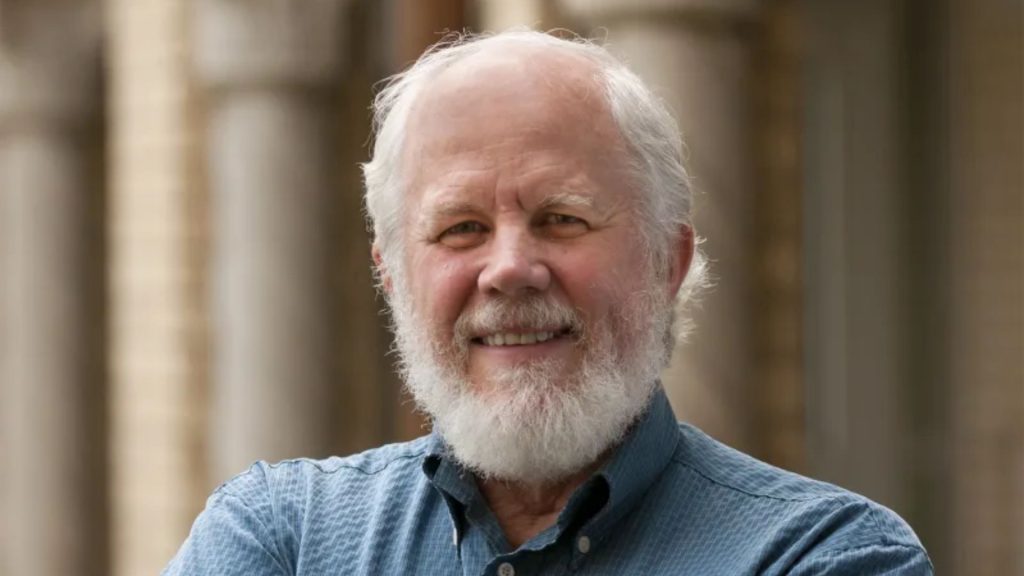By Kristin Raybon
During his first year as a DTS student, Reg Grant (ThM, 1981; ThD, 1988) taught what would later become an independent class.
The chair of the department in Pastoral Ministries, Dr. John Reed, “wanted to expand the arts at the seminary and invite people who would work in drama in the local church, which was pretty new back in the mid-70s.”
What a stroke of providence, then, that DTS had just accepted an actor as a student.
Although accepted in 1976, Dr. Grant—like the other nine accepted students of ‘76—had to wait until the fall of ‘77 to start classes. But even before Dr. Grant officially started his coursework, Dr. Reed paid him to coach students. “So, I started coaching and instructing students my first year as a student, even though I wasn’t officially attending classes.” And when the fall of ‘77 finally came around, Dr. Grant started teaching a class with Dr. Reed and instructing his own section of what we now call Dramatizing Scripture.
“In those days, it was called Effective Pulpit Delivery, because they didn’t really feel comfortable with acknowledging that we were teaching drama here, but that all changed. . . I started working my first year in ‘76 and getting paid for it and started teaching with my own section in ‘77.”
MAGNETS
In those early years, Reg Grant, John Reed, and Don Regier (the audio/visual course instructor) were “sort of magnets for artists” at the seminary who “didn’t feel like they had a home in the church.”
“When people would come to me, John, or Don, we would say ‘welcome home’ and provide opportunities for them to explore their gift set, which was rarely the gift of pastor.” Demand eventually grew to the point that DTS wanted Grant to design a program that focused on the worship arts within the Master of Theology (ThM) program.
And Dr. Grant’s work with artists did not stop there.
By 2005, the ThM emphasis in the arts Dr. Grant designed had grown. Now there was a need for another program, a two-year MA program. DTS began offering the Master of Arts in Media and Communications degree program to equip students to serve the body of Christ with both an artistic and a theological perspective. The growth didn’t stop there; that master’s program increased so much that Dr. Grant needed to start a new department. He recalls, “They said y’all are too big for pastoral ministry.” The department of Media Arts and Worship started in 2012.
So, in thirty-five years (1976 to 2011), God led Dr. Grant from the bright stage lights to the glowing yellow brick buildings with terracotta roofs of Dallas Theological Seminary and—step by faithful step—into the creation of the Media Arts and Worship department and classes.
A PLODDING HIKER
“I got here when the seminary had just passed its fiftieth anniversary. Now, I’m here for its hundredth.”
And the journey? A long and plodding hike.
“It was plodding. It definitely wasn’t running. If you’re an artist at DTS, you have to have a long-range view of your call. And you have to be sure that you are where God wants you to be because you’re going to run into a lot of walls, a lot of resistance.” Often, people think of ministry only in terms of preaching and do not consider the ministry work of authors, poets, musicians, and painters. “You just need to keep plugging, keep plodding; just keep putting one foot in front of the other. And it’s not a race. It’s been more like a long-distance hike.”
But it’s been a hike with victories along the way. “The Lord has blessed the Media Arts and Worship department by keeping us around. We’re still here. And that hasn’t always been easy. But it’s been a blessing because we are right where he wants us to be.”
“I have seen the evolution of attitudes toward the arts, and, in particular, toward our department, move from one of toleration to acceptance to endorsement.” Yet, despite having “practically no advertising,” prospective students continue to enroll.
“We’re still forty-plus students in the program.” But Dr. Grant has made plans to help that number grow. “We’ve got enough courses and enough faculty to sustain a lot more students, so we have the infrastructure in place.”
EXPANDING HORIZONS
Since the creation of the Media Arts and Worship department thirteen years ago, it has grown in more ways than one. And Dr. Grant keeps dreaming about what’s next.
“I want to expand in all three areas. . . performance, worship, and writing. Those are the three main areas that we are investing in. The one that is going to receive a lot more attention in the near future will be worship because (worship leader and musician) Todd Agnew will take over as the department chair July 1. With his influence and recognition in the industry, he will be able to attract more students to the worship aspect of the program. With Sandra Glahn’s influence in writing, she will attract writers.” And now the newest team member, Dr. Brian Chan, brings to the department “influence in performance and visual arts, which is an area we haven’t really explored yet.” Also, as part of the growth in the visual arts, Dr. Grant is working to create an art studio on the second floor of Mosher.
Dr. Grant’s dreams for Media Arts and Worship are much bigger than the seminary’s Swiss lot. “We’re getting stronger internationally. We are looking at opportunities in Spain for Brian and in Poland for Brian and Todd to work with artists over there, preparing them for worship.” These would be in addition to the immersive courses Dr. Sandra Glahn teaches in England (British Authors Themes) and Italy (Medieval Art & Spirituality). And, in the US, she also leads a course for the Festival of Faith and Writing in Grand Rapids, Michigan. Down south, Dr. Glenn Kreider leads a course on music and culture at South by Southwest in Austin, Texas. Heading west, Dr. Neil Coulter and Dr. Chan teach a course at the Sundance Film Festival in Utah. “So, with all of that, we’re expanding and having more of an international voice, international influence, which we hope translates into being able to help more students and invite them here for further training. That’s the legacy I want to leave—that it is not just an insular domestic program, but one that reaches beyond our own borders.”
But wait. There is more. The department is in the process of developing a new PhD program, one that, as Dr. Grant says, will especially suit ThM students with an emphasis in Media Arts and Worship.
PASSING THE BATON
On June 31, Dr. Grant retired and handed off his position as department chair to Todd Agnew. But Dr. Grant will not be gone from Dallas Theological Seminary’s Great Lawn for long.
“I’m turning this over to Todd. I don’t literally check off the days, but I’m getting out of administration (his least favorite part of his job). I’m gonna do this with students (sitting down with students, one-on-one, and chatting).”
“I’ll start adjuncting either in the spring of ‘25 or the fall of ‘25 and doing one course a semester. I’ll still be around and meeting with students and trying to raise money for projects, like the studios.”
LESSONS
From all these years at Dallas Theological Seminary, what has Dr. Grant learned?
“I talked to Prof. Hendricks about this back when I was a student. I am one that likes to see an ROI, a return on investment, that’s immediate. And Hendricks said, ‘Reg, what is the old math formula?’ Of course, he’s asking the wrong person. . .he said, ‘Let’s apply that to the spiritual life. So, rate is something you’re in control of, how fast you go in the lane that God has given you. Your goal is to achieve maximum distance in your spiritual life. You want to go and get as far down the road as you can in your spiritual life, right?’
‘Yeah.’
And he said, ‘Where everybody wants to sacrifice is time. They want to go from rate to distance. But you can’t get there without time. That’s not the way the Lord works. The Lord works in terms of decades, not years, not months, or weeks or days.”
So, what’s Dr. Grant’s advice to students? “Slow down.”
“It’s Matthew 6:33—it’s seeking ‘first the kingdom of God. And all these things will be added unto you.’ It’s not ‘build the kingdom of God.’ It’s seeking the things. You can’t be in a hurry if you’re treasure hunting. Treasure hunting requires patient excavation. That’s what I hope I am doing now, patiently excavating every day, every hour, every moment. . .I’m not distracted by something, by my next meeting. I’m not thinking about what I shouldn’t be, could be, ought to be, might be doing. . .So, be all there. And you can only do that if you’re going slowly enough to enjoy the moment.”
And if you need a new pair of shoes for your own slow, long, and patient plodding hike filled with treasure, Dr. Grant recommends Skechers—Extra Wide-Fit, Air-Cooled, with Memory Foam.


